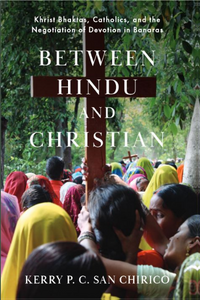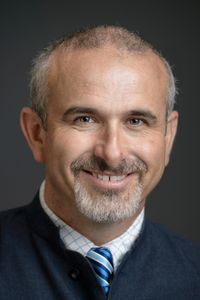Theology and Religious Studies Professor’s New Book Explores Unexpected Worship of Jesus in Northern India

VILLANOVA, Pa – India is the second largest nation in the world by population, with an estimated 80% of its residents practicing the Hindu faith, and only 4-6% of the population practicing Christianity. Yet within the larger population, some devotees have unexpectedly gravitated towards Jesus, a rather novel deity in northern India, specifically the Banaras region.
In Between Hindu and Christian: Khrist Bhaktas, Catholics, and the Negotiation of Devotion in Banaras (Oxford University Press, 2023), Kerry P. C. San Chirico, PhD, associate professor of Theology and Religious Studies at Villanova University, explores the surprising rise of worshippers who blur the lines between Christianity and Hinduism.
Dr. San Chirico examines the beliefs and practices of Khrist Bhaktas, or devotees of Jesus, as well as members of the Catholic order who seek to share Jesus, Mary and other significant figures of the faith with those interested, demonstrating a degree of “porousness” between Hinduism and charismatic Catholicism. Anchoring his research in the area’s rich cultural context, he unpacks how Catholicism entered the nation, chronicling the devotional history of the Banaras region, the history of Indian Christianity, the rise of low caste and Dalit emancipatory strategies, and the ascendance of Hindu nationalism. “Because they do not fit into tidy religious categories, the Khrist Bhaktas are good to think with,” San Chirico explained. “And that is what I am trying do in this book, which had its birth in 2008 when I encountered the movement for the first time.”

"This is an elegantly written study of the Khrist Bhaktas, a devotional movement that exists in the indeterminate space between Hindu bhakti and Catholic charismatic practice, on the one hand, and between the institutional church and the Hindu nationalist state on the other. San Chirico's analysis of this anomalous movement opens a remarkable window on a grassroots process of indigenization and hints at the fate and possible future of Christianity in the north Indian 'Hindi belt'," notes reviewer Ann Taves, PhD, distinguished professor emerita of Religious Studies, University of California at Santa Barbara.
Corinne Dempsey, author of The Goddess Lives in Upstate New York: Breaking Convention and Making Home at a North American Hindu Temple, likewise claims Dr. San Chirico “manages no small feat in bringing the Khrist Bhakta movement, one that eludes ready-made labels, to clarity and life. Rooted in the heart of Hindu India, Catholic priests serve members who take Jesus as their chosen deity and yet largely remain unbaptized. Unraveling historical, social, and religious strands to elucidate the movement's vitality, San Chirico masterfully brings us close, as well, to the stirrings and lives of those who take part."
Dr. San Chirico holds a bachelor’s degree in Political Science from Santa Clara University, and master’s degrees from Princeton Theological Seminary, Rutgers University, St. Vladimir’s Seminary, and Boston College. He earned his doctorate in Religious Studies (South Asian religions) from the University of California at Santa Barbara. With expertise in Global Christianities and Indian religions, his scholarly interests include interreligious studies, minority religions of India, and comparative theology. Dr. San Chirico previously taught at University of Hawai’i at Mānoa and was president of the Society for Hindu-Christian Studies. He has contributed to the Georgetown Companion to Interreligious Studies, the Routledge Handbook of Hindu-Christian Relations, and co-edited, with Rico Monge and Rachel Smith, Hagiography and Religious Truth: Case Studies in the Abrahamic and Dharmic Traditions (Bloomsbury Publishing, 2016). At Villanova he is an active member of the Interfaith Advisory Council.
About Villanova University’s College of Liberal Arts and Sciences: Since its founding in 1842, Villanova University’s College of Liberal Arts and Sciences has cultivated knowledge, understanding and intellectual courage for a purposeful life in a challenging and changing world. With more than 40 majors across the humanities, social sciences and natural sciences, it is the oldest and largest of Villanova’s colleges, serving more than 4,500 undergraduate and graduate students each year. The College is committed to a teacher-scholar model, offering outstanding undergraduate and graduate research opportunities and a rigorous core curriculum that prepares students to become critical thinkers, strong communicators and ethical leaders with a truly global perspective.
